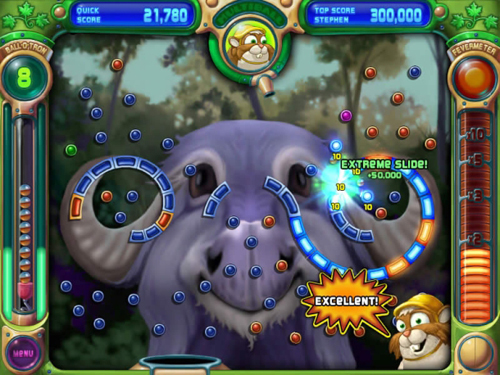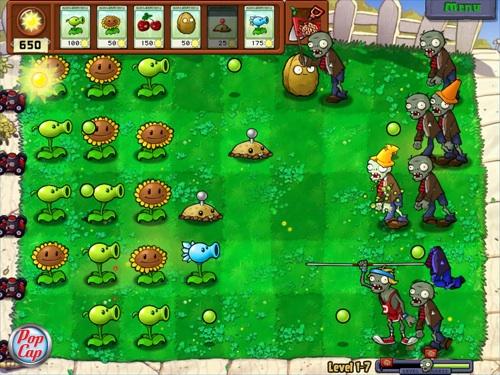游戏质量不打折扣,PopCap Games稳步推动上市进程
休闲游戏巨头PopCap Games正在发生变化。问题是:它发生了什么变化?
电子游戏领域的投资者希望这是他们希望的那种变化:PopCap Games这家人见人爱的独立游戏公司公开发售股票。不过近来电子游戏领域的大量浮动资金也表明,没有人可以排除PopCap Games被收购的可能。
PopCap目前正在准备上市。在过去1年半中,该公司接受董事会接纳了不少外部人员。这大大提高了PopCap的年收入,游戏邦获悉该公司去年的收入就超过了1亿美元。PopCap已经向美国证券交易委员会递交了注册登记表格,迈出了公开募股的第一步。不过,PopCap的高层仍然在观察形势,以便执行下一步计划。
PopCap首席执行官大卫·罗伯茨(David Roberts)表示,“我认为我们自己已经准备好了。但市场是否准备好了呢?我们还得静观其变……我们处于有利地位。”
该公司也正权衡其他选择,也有很多投资者主动找上门。PopCap之前就有接到一些人伸出的橄榄枝,但没有哪一家合作对象能够引起他们的兴趣。去年手机和社交游戏公司的估值直线上升,大量涌入的风险资金让几个新晋发行商获利丰厚。
以Zynga为例,它的身价将近100亿美元。游戏邦获悉,今年Zynga营收有望达到18亿美元,其中净利润就达6.3亿美元。Zynga目前正与两个互助基金公司筹备5亿美元的融资活动。
罗伯茨承认PopCap和几家公司谈过,但他表示公司还在考虑自己的选择。“已经提交了注册登记表格,相信就会有公司来买你。但我们的目标不是找到PopCap的发展出口,而是开发像《大富翁》、《Scrabble》一样受欢迎的游戏品牌。”
游戏邦发现PopCap不管是未上市还是选择上市,都具有十足吸引力。首先,该公司拥有《植物大战僵尸》、《幻幻球》、《宝石迷阵》、《祖玛》及《bookworm》等炙手可热的游戏作品,用户覆盖面都很广。任何投资者都希望能够通过其中一款游戏获利,该公司最近开始推出大量新作品,快速发展但并不冒进。
M2 Research资深分析师比利·皮得根(Billy Pidgeon)表示,“PopCap每一步都走得很小心,这很好。他们会继续发展但不会失控。”
最后,由于手机和社交游戏领域的革命性发展,该公司近年的项目运营也跟着水涨船高。罗伯茨表示,“在过去3年里,我们通过Facebook和iPhone平台吸引了有史以来最多的新用户。”
1亿美元的收入相当可观,但和业内的Zynga这种巨擘相比,PopCap还是有些差距的。这可能会对潜在的股票价格有所影响,但罗伯茨认为这是可以调控的。他认为要让投资者满意,关键是公司得制定一个目标,然后努力实现它,最后,人们最为期待的当然是执行的部分。罗伯茨认为,“只要期望合理,执行就应该没问题。我们只是小公司,靠软件谋生,所以很难预测营收。但是在过去16个季度,我们就有15个季度的营收实现预期。”
PopCap的变化真正让人担心的不是投资者的接受程度,而是上市对该公司企业文化所带来的影响。游戏邦认为让股东开心与达到他们的期望是两回事。
皮得根认为,“如果这些公司上市,我担心他们会失去现在拥有的一些机会。他们的产品本来是很有成为迪斯尼、任天堂作品的潜质,大家对他们的游戏质量也寄予厚望……我对他们的发展策略很担忧,因为他们可能会因此丧失曾经的成功要素。”
但罗伯茨并不是很在意业内的这种担忧,同时指出PopCap向来把质量放在第一位。他原本一直想提早几个月推出《植物大战僵尸》,但团队成员一直说服他游戏得再多加润色才能面世,所以它才成了后来叫好叫座的游戏。此外,公司还放弃了一些不符合公司标准的游戏。
罗伯茨表示,“我们放弃了很多没有问世的游戏。如果开发团队不喜欢这个游戏,我们就不会投入制作。从产品质量中就能看出开发人员是否投入大量心血。”
The Money Making Game #6: Should PopCap Go Public?
Will everybody’s favorite casual games company sell… or sell out?
We certainly have no problem getting caught up in the fun of playing games, but the people who create them have their pocketbooks to worry about, too. In this column, finance expert and GameSpy contributor Chris Morris guides you through the tricky corridors the gaming industry’s financial side, touching on big-time business decisions and how they matter to the common gamer.
Poppin’ Those Sweet Stock Caps
Change is on the way for casual games titan PopCap Games. The question is: What sort of change?
Investors in the video game space are hoping it will be the odds-on favorite: A public offering by the beloved independent game company. But with all the cash floating around the video game space these days, no one is ruling out a takeover.
PopCap, for its part, is currently taking all the steps required to go public. The company has been adding outsiders to its board of directors for the past year-and-a-half. And it’s boosted its annual revenue, which topped $100 million last year. For now, though, PopCap’s bigwigs are biding their time — gauging the waters and pondering the next step.
“I do think we’ll be ready internally,” says CEO David Roberts. “Whether the market is ready remains to be seen. … It has got to be right for us.”
While the company weighs its options, the suitors are calling. PopCap has received offers before, but none have been sufficient to capture the company’s interests. But in the past year or so, valuations of companies that are closely tied to the mobile and social gaming space have skyrocketed — and the rush of venture capital money has given several new publishers a lot of spending money.
Zynga, for instance, has a valuation of nearly $10 billion. This year, it expects to generate $1.8 billion in revenue, with $630 million of that being pure profit, according to published reports. It’s also in the midst of working with two mutual fund companies for a financing round worth another $500 million — making it the frontrunner among potential suitors.
Roberts acknowledges PopCap has had conversations with several companies, but says the company is still considering its options. “Whenever you file an S12, you’re pretty much guaranteed that someone will come and try to buy you,” he says. “Our goal is not about an exit at PopCap. It’s about creating this legacy of games that mean as much as Monopoly and Scrabble to the world.”
A few things make PopCap particularly appealing to both the private and public sectors. First, the company has a tremendous stable of franchises. Plants vs. Zombies, Peggle, Bejeweled, Zuma, and Bookworm are all big hits with broad footprints. Any investor would be happy to have a piece of them. The company has also ramped up its production lately, but not to the point where it’s over-reaching.
“PopCap is moving conservatively, and that’s good,” says Billy Pidgeon, senior analyst of M2 Research. “They’re growing, but not too fast.”
Finally, it’s seeing big growth these days thanks to the mobile and social revolutions in gaming. “We’ve probably gotten more new customers from Facebook and the iPhone in the past three years than we’ve ever had in our history,” says Roberts.
Revenues are impressive at $100 million, but they’re hardly in the same league as some of the industry’s bigger players, including Zynga. That could put a ceiling on potential stock prices, but Roberts says he thinks it’s something that can be managed. The key to happy investors, he says, is to set a target and meet it. Ultimately, execution is what people are looking for. “It’s OK as long as you’re setting expectations right,” he says. “We’re a little company. That makes us unpredictable in terms of revenue. We’re software-driven — which makes us unpredictable in terms of revenue. But we’ve been on forecast for 15 of the last 16 quarters.”
The real fear of any change at PopCap isn’t about investor acceptance; it’s on what it might mean for the company’s culture. Keeping shareholders (or new corporate overlords) happy is a lot different than meeting their own expectations. And the constant demand for improvement of the bottom line has trumped quality at a number of other companies.
“If they go public, I wonder if they’ll start to lose some of the mojo they have right now,” says Pidgeon. “They have sort of a Disney or Nintendo thing going on, in that there’s a certain expected quality to their games. … I’d really be concerned about their growth strategy, as it could cannibalize the elements that have made them successful so far.”
Roberts downplays those concerns, noting that PopCap has always valued quality above everything else. He notes that he wanted to ship Plants vs. Zombies months before the game came out, but the team convinced him it needed more polishing. That, ultimately, was what made the game a breakout hit, he says. Meanwhile the company has spiked several other games that just didn’t have that PopCap touch.
“We kill a lot of products before they go out the door,” Roberts says. “If the team’s not jazzed about doing it, we don’t make them. It shows too much in the product if it’s forced labor.”(Source:gamespy)









































 闽公网安备35020302001549号
闽公网安备35020302001549号